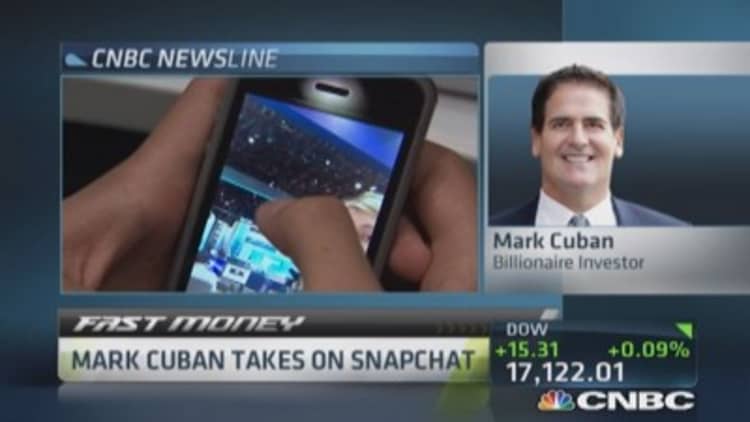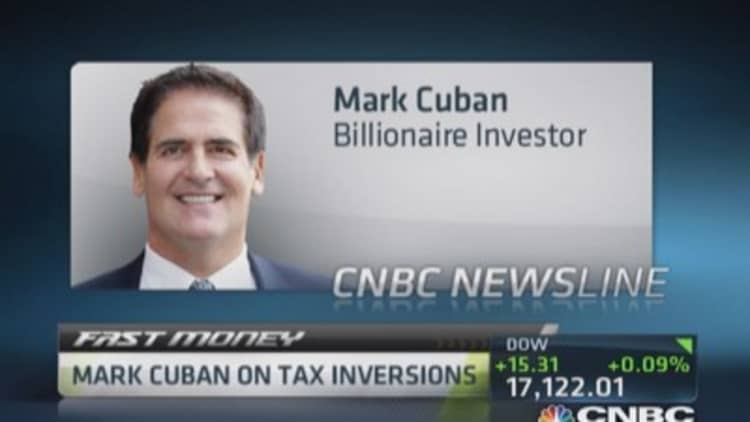
Mark Cuban knows the value of privacy.
The billionaire investor and Dallas Mavericks owner, who was acquitted of insider trading in October, told CNBC's "Fast Money" about the inspiration behind Cyber Dust, a new messaging app he funded.
"I had my little fun with the SEC, and what happened was, every message I sent, everything that I wrote, they decided to create their own context," he said Wednesday. "If I said, 'The sky was blue,' they said, 'You didn't really mean that. You were just trying to fool us.' When I said, 'I hate to lose,' in reference to Mavericks games, they said, 'So, you hate to lose. You're not willing to take a loss on a share trade.' I mean, it was just ridiculous. And so it made me realize, along with just other experiences, when you hit 'send' on a text, you lose ownership of that. Not only do you lose ownership, you retain responsibility for that text."
Cuban said that inopportune texts were all too common in business and private lives.
"It pops up all the time," he added.
To that end, he backed development of Cyber Dust.
"After I send you a message on Cyber Dust and you read it, it's gone forever," he said.
Cuban said that he uses the app for 80 percent of his messages, save a few text-messaging holdouts.
"It's cut down on my email, too," he said. "A lot of folks are calling it 'email 2.0' because when you email somebody, we tend to be long-worded and it just builds up, and our email boxes back up. On Cyber Dust, when I send you a message, it has to be short by definition because you don't have forever to read it. And your responses are short, and you reply immediately. And so, I've cut my email dramatically as well."
Cuban pushed back against the idea that the app was meant to hide anything.
"Look, 99.999 percent of traders don't have inside information. It's just a better way to communicate," he said. "But if I want it to be private between us, and if for some reason the SEC goes bonkers like they always do and decide to assign some sort of nefarious action to you, they can't do it."
While ephemeral-messaging app Snapchat received a new $10 billion valuation, based on a reported $20 million investment from Kleiner Perkins, Cuban said he didn't know what Cyber Dust might be worth.
Read More Kleiner Perkins $20M investment values Snapchat at nearly $10B: DJ, citing sources
Would he sell for, say, $6 billion?
"Oh, yeah," he said. "Of course I'm taking it. I'm not an idiot."

Cuban added that Snapchat's valuation was justified.
"Is SnapChat worth $10 billion? Yes because it's really hard to put together the amount of users they have," he said. "Are they going to be able to monetize it, even though they haven't yet? Yep, really easily. I think what everybody misses is when they look at the valuation of all these things is that the amount of money that it costs to build up a following for mobile apps is enormous."
Cuban also weighed in on tax inversions, the acquisition of a foreign company by a U.S. company, which then reincorporates overseas to pay the host nation's tax rate.
"Look, there's no free lunches. When I move from California to Texas, I may not be paying a state income tax, but my property taxes are higher," he said.
"People think that the purpose of stocks is to buy a stock and watch it go up in price. That's not the point. The point is to see your net worth increase. And if a company is doing a tax inversion, that's money that they were paying in taxes they're no longer paying in taxes.
"Now, one company, two companies, five companies — that's not a big deal in the multitrillion-dollar economy. But if it catches on and that becomes an ongoing trend where every company is buying a little startup or just a little company overseas, now all of a sudden it has a real impact on the tax revenues of our country."
— By CNBC's Bruno J. Navarro


